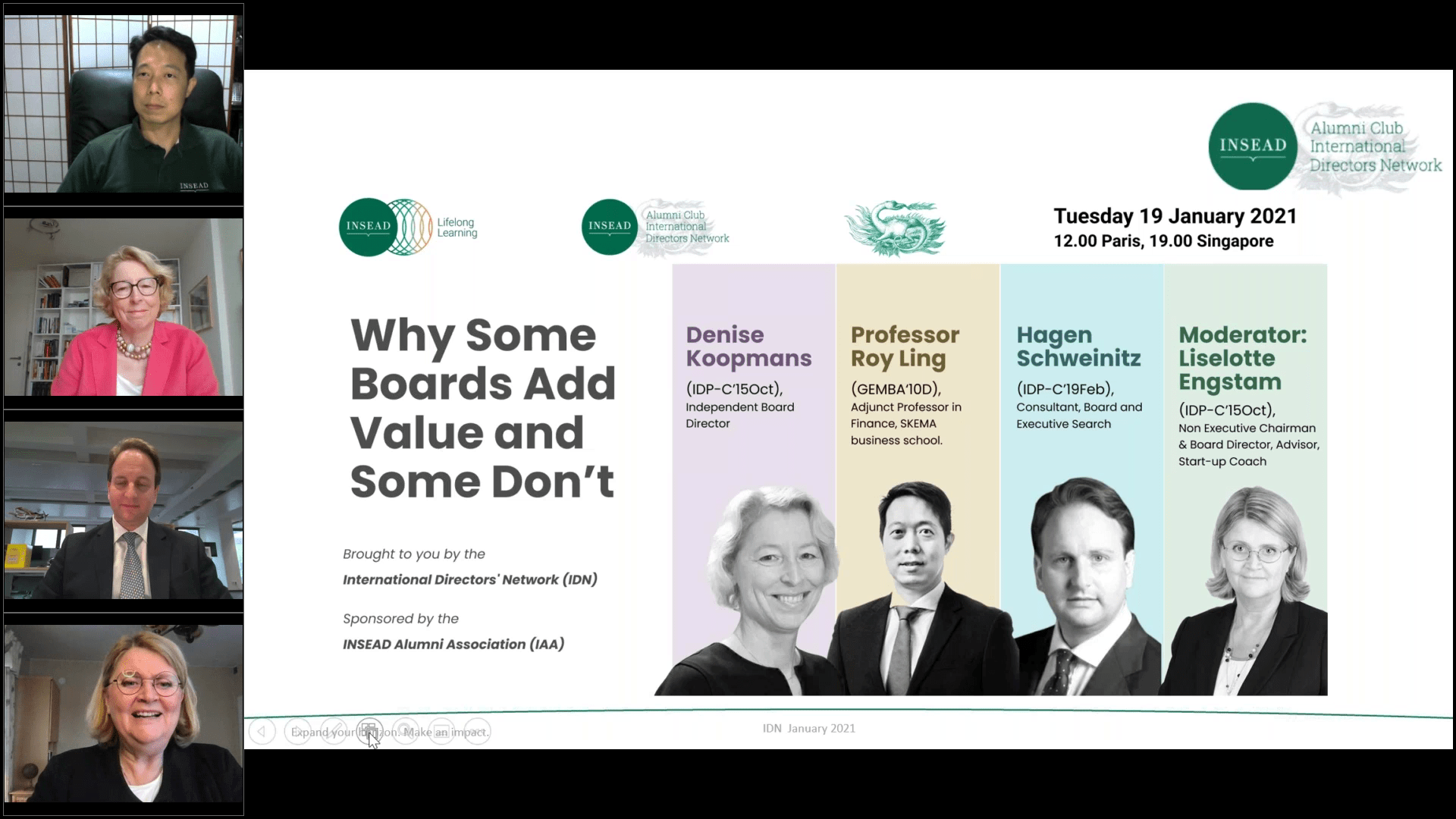Winner IDN Award 2021 (Outstanding Mandate, Not-For-Profit category)
In October 2021, INSEAD Directors Network (“IDN”) announced the three winners of the IDN Awards 2021.
Two of the three awards were given to IDN members with Outstanding Mandates during the year. Each has an outstanding track record and has demonstrated the highest levels of integrity.
Doris Albisser IDP-C, Member of the International Senate, SOS Children’s Villages, and President, SOS Children’s Villages Switzerland, was the winner of the not-for-profit category. Doris recently shared with us about her illustrious board career and her advice for aspiring directors.
You have had an illustrious career, from a translator to a CEO and entrepreneur. You have worked with many international organisations and are now an experienced board chair and director across several sectors. Tell us about your journey to becoming a director?
My entire CEO and board life was an enriching learning journey across industry sectors and countries. From building up a start-up through a business process outsourcing, internationalization through organic and inorganic growth up to its trade sale. During this journey you kind of live through a full circle, including dealing with crisis situations. As an entrepreneur you strive for the best – always go the extra mile and never give up.
I moved into the joint role of CEO and managing director, when we founded CLS Communication in 1997 – a technology driven language & translation solutions provider. In the beginning the board role was more demanding than the CEO role, since I first had to become familiar with corporate governance. As for executive functions I attended various corporate governance programs – also in order to know what I am doing approximately right and what exactly wrong. I found those programs very enriching from the content side but also from learning from peers across the world.
One common thread throughout my life was and still is lifelong learning on the job and through continuous education. (Doris Albisser)
Currently, I am focusing on board mandates as chair or member, as this is a fascinating role given my professional journey so far. Hence, I continue my learning journey.

What do you most enjoy about being a director?
In a director or chair role you act as a sparring partner to the CEO and the executive team. The roles are clearly defined. Personally, I find it fascinating when you can enable and empower a CEO and the executive team to shine. Each company and organization has its own opportunities and challenges. As a chair you have to make sure you lead and gear group dynamics in the board, ensure fair process leadership is in place.
Each board mandate offers a learning journey for both the organization and the director. It is a win-win situation.
As a director you have to be up-to-date with business innovations, new business models (incl. ecosystems), digitization and agile organizations to name a few.
To me it is of prime importance that the chair and the CEO ensure a solid corporate and organizational culture is being lived across all levels. Culture has to be based on shared values. It is the DNA of a company or an organization.
Apart from ensuring best practice in governance – boards’ primary task – they are required to be familiar with trends arising on the horizon, in an ideal situation they anticipate them.
Last but not least, boards have to oversee that sustainability goals (ESG) are reached. The far-reaching decisions boards have to take requires them to be familiar with and savvy on the above listed topics. They cannot be delegated to digital natives and the younger generation.
As a result, as a chair or director continuous board education and ongoing training on the various topics is important to stay tuned and relevant.
How does your role as a board chair and director complement your work as a CEO and entrepreneur, and vice versa?
The roles are different, yet complementary.
As CEO my role was predominantly operational, whereas as chair or director you have a more strategic and an oversight role. The link both roles should adopt is the strategic part. A board cannot define a strategy without active involvement of the CEO and the executive team. Therefore, especially the CEO must be able to have a strong strategic view.
The role of boards has changed substantially over the last years. A board should act as an enabler, a sparring partner versus the traditional role of an “administrator” as was predominantly the case in the past.
Personally, I benefited from both roles – as a CEO and as a chair/director – bearing in mind that you have to know which hat you are wearing.
The CEO background helped me understand the challenges a CEO is facing and proactively assuming my chair role accordingly. As a chair you have to listen and reflect first before moving into action.
As a CEO you are moving more in the acting mode.
As a chair/director you have a clear information deficit compared to a CEO, who lives and works in the company full time. Hence, even with extensive board experience, we have to make sure we do not become overconfident and in the worst case clueless.
From your experience as a board chair, what type of attributes do not-for-profits look for when evaluating potential board directors?
Not-for-profit organizations are very purpose driven. It is therefore important for a new member to fully identify with the NPO’s purpose and truly love working in such an environment.
An NPO can benefit substantially by running an organization with an entrepreneurial spirit. I usually compare it to family businesses existing for generations. NPOs need to generate “profits” to invest into new programs and enhance existing ones. They need to follow the trends their donors do. Generally, this means attracting also a younger generation of donors – hence more digital programs.
When attracting new board members, it is a plus for the candidate to have experience in the for-profit sector. NPOs like for-profits have to ensure diversity in terms of competences, gender, experience, backgrounds in various industries. In NPOs, too, boards have to mirror the executive teams regarding their skill sets.
Last but not least, as with for-profit companies, candidates must have a solid value system such as trust – integrity – reliability and bring along a “pinch” of curiosity.
What advice do you have for directors who wish to gain more mandates in the not-for-profit space?
Directors should look for organizations where they can fully identify with the NPO’s purpose, where they can bring an added value. Their background may come from different sectors.
Working on the board of an NPO very often is a question of having one’s heart and soul in it. Since NPO mandates often are pro bono, the financial aspect should therefore not play a role at all.
Taking the example of SOS Children’s Villages: What stronger purpose can you pursue than to actively contribute to children and young people to become their strongest selves, to ensure they have a healthy nutrition, are well-educated and grow up in a safe environment with loving care. This enables them to live an independent, self-sufficient life and contribute to their communities’ ongoing development and well-being. To me, this is a highly noble and rewarding mandate.
As told to Karen Loon, IDN Board Member.













